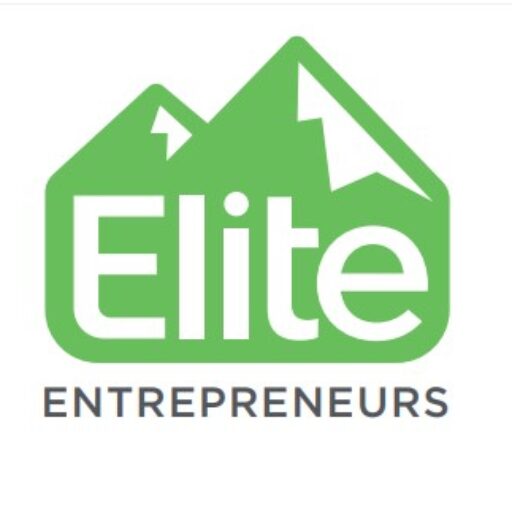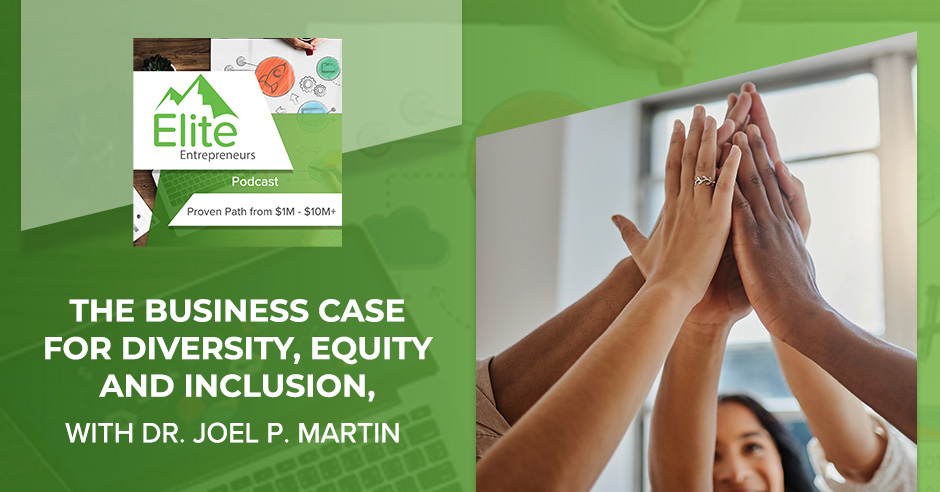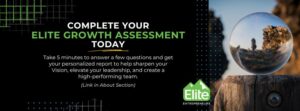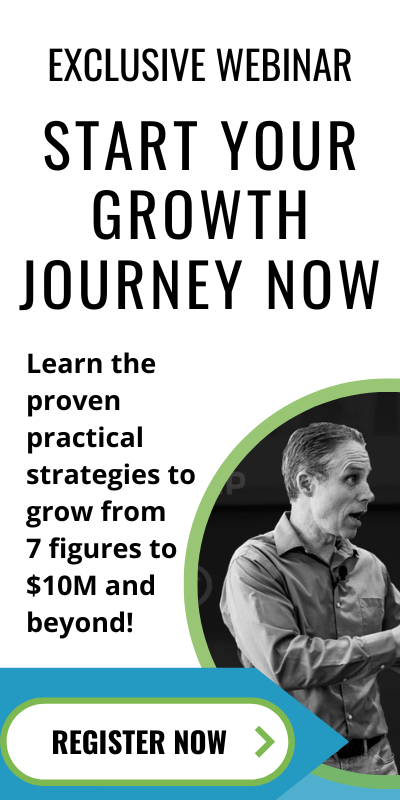Episode 110: The Business Case For Diversity, Equity And Inclusion, With Dr. Joel P. Martin
Dynamic results-oriented Strategic Implementation Consultant, Trainer and Executive Coach, Joel P. Martin, Ph.D., (she, her) is the Founder and President of Positively Powerful-Triad West, Inc. Dr. Martin has a demonstrated ability to create visionary transformational leaders; diverse, inclusive, and high performing teams; empowered women, people of color, new managers and other professionals who, after working with Dr. Martin, are less-stressed more creative, inspired, happier, and Positively Powerful™ in their lives and careers.
For more than 20 years, Dr. Martin has trained, coached, consulted, and spoken before hundreds of thousands of individuals around the world. With her insightful expertise, unconditionally committed, heartfelt New York City style (her hometown), she provides clients with services that address their business development and DEI needs and provides innovative solutions that close the gap from where they are now and where they want to be. She is dedicated to changing lives and businesses for the better globally.
Dr. Martin practices life-long learning and giving back to communities. She’s earned numerous awards as well as a MA in Psychology, PhD in Communications and admission into the Society of Fellows, Wharton Business School. Previously she owned and operated a full-service New York City advertising agency.
What You Will Learn:
- How Dr. Martin’s career path led to becoming a globally respected speaker, thriving entrepreneur and business leader
- Why Dr. Martin chose to go back to school later in life and pursue her Ph.D., and why she believes strongly in lifelong learning
- Why a diverse and inclusive work environment inspired Dr. Martin to begin speaking and making a difference in people’s lives
- Why sharing your truthful and personal story can be a powerful way to create authentic, deep connections with others
- What steps you can take to improve your Diversity, Equity and Inclusion (DEI) skills, and why these skills are valuable business assets
- Why optics matter even more as more activities move to a digital space, and how to evaluate your company’s DEI optics
- Why you should consider becoming a member of your local Chamber of Commerce, and what benefits you can receive from that partnership
- Why stereotypes can lead to undervaluing and disrespecting people and can even impact your ability to hire the best people
Resources:
- 30-Minute Complimentary Consultation: https://calendly.com/jpmartin
- Website: positivelypowerful.com
- LinkedIn: linkedin.com/in/drjpmartin/
- Facebook: https://business.facebook.com/COLeadership/
- Twitter: @Drjpmartin
Additional Resources:
- Elite Business Health Assessment: https://growwithelite.com/health
- Email: info@GrowWithElite.com
- Website: https://growwithelite.com/
—
Listen to the podcast here
I have the tremendous pleasure of welcoming our guest. Her name is Dr. Joel P. Martin. Dr. Martin is a dynamic, results-oriented, strategic implementation consultant, trainer, and coach. What that means is that she knows a lot about helping people become empowered transformational leaders. That includes things like diversity, inclusion, equity, high-performance teams, empowered women, people of color, new managers, and other professionals, who after working with Dr. Martin are less dressed, more creative, inspired, happier, and positively powerful in their lives and careers.
Dr. Martin has been working on this stuff for more than twenty years. She’s trained coached, consulted, and spoken before hundreds of thousands of people around the world. I am thrilled that she’s here with us in our humble Elite Entrepreneurs Community of seven-figure business owners to share some of your great earned experience and greater wisdom. Dr. Martin, thank you for being here.
It’s my pleasure. I’m delighted to be here with you all as your humble speaker for this episode.
You’re our special guest. As you know, our show is dedicated fully to a group of people who are making the transition from founder to scrappy startup, gritty, and throw it on their shoulders and go make it happen types of doers. These are superhuman beings who’ve created something viable, and then they’re making the transition from doer to leader, then eventually leader of leaders. They’re building their businesses beyond what they can do or create on their own. That’s a shift.
People like you are wonderful. You come in and you give them perspective about that transition from learner and doer to leader and leader of leaders as they scale their businesses. Why don’t we start with a little bit of your background? You’ve spoken to audiences all over the world. Tell us a little bit about how that came to be, and then we’ll dive into some of your specific areas of expertise around DE&I.
I started as a mom. My background before being a mom was a degree in Audio-Visual Communications from Ohio State University, and then I moved to New York when I was recruited by IBM. I became a designer for them. I love being creative. When I fell in love and got married, I learned that to raise your child to the best of your ability, it makes sense to be with them for the first three months. That meant that I left the art director’s position that I had before and stayed home for three years.
I’m sure there are some people out there that will understand this. I thought I was going bonkers because I wasn’t creative and I was devoting my life at that time to our daughter, and Bob was working. That’s my husband. He’s a painter. When she was three, I put her on my back and I went to New York City and got clients. We were living in Upstate New York at that time.
One person at a time. One company at a time. One business at a time. I kept going and living my passion. Ultimately, I became one of the first women to own and operate a full-service advertising agency. I got a new business. I had some ups and downs, but your folks wouldn’t be on this interview with you, Brett, if they didn’t keep going with their dream, which is what I did.
That’s the beauty of interviewing 100 episodes. I’m interviewing all these people and every story is a little unique. The common thread that you talked about was figuring it out, the grit, and perseverance, which is awesome. It’s sometimes easy for people to disconnect when we have somebody as well educated as you. I’m going to keep referring to you as Dr. Martin, but you know what it’s like to build a business like the rest of us. That’s a special combination.
Can I tell you something about all those letters I have to my name? The reason that I went back to school is I did this for Bob and my daughter. I’m always claiming her as my own, but I couldn’t have brought her here by myself. When my daughter started her education at Penn, I went back to school. That was because, at the time, my agency had grown. I walked into this training room of transformational leadership as a rookie. I knew nothing about that discipline. Can I be honest with you?
Please.
I chose to be a trainer. At first, they said no because I was of a certain age, a certain disposition, having run my company, and having a multimillion-dollar billing agency, a record of Anheuser-Busch, and a lot of great things. As I said, ups and downs. They told me no. I’m not someone who takes the word no easily. I remember it so well. I sat at that table with the White man who was the senior master trainer at the time in a few people of color. They were using words I had no idea what they were talking about.
I love this in terms of the feedback that you gave me for my presentation before. I need a lot of these words like existentialism, ontology, and all of these things. I sat there and I got so po’ed. I said, “I am not going to be anywhere where I can make a contribution in the same way that my colleagues were making a contribution.” That’s why I went back to school because I wanted to understand why this kind of technology would work. Why is it that experiential meaning? You learn it by doing or through simulation. You sit in your chair and imagine you do all these things. I want to know why that worked. I’m curious.
That’s why I got those letters after my name because it was part of what you do when you go back to school like psychology and communications. You call me doctor. A lot of people just call me JP because my ad agency was JP Martin Associates. That’s how I came to be called a doctor. I’m Joel or JP.
I want people to know you as you.
That expression, “Call me whatever you want just don’t call me late for dinner.” I’m like this. Whatever it takes to be of service, I am very flexible in that because I am not there for my own ego gratification. I am they’re to have people win. You call me doctor if you want to or JP or Joel. It’s fine.
Do whatever it takes to be of service to others. Share on XThank you so much for offering that. I’m amazed at your story because not a lot of people do that. They go back to school later in life, to go and improve themselves, and continue to grow and learn. Every single business owner that I’ve ever met who continues to have their business growing knows that it’s important to grow themselves. Growing ourselves as business owners enables our business to grow. There’s a direct correlation. I’ve seen that a ton. You can continue to learn and grow. Your ad agency is successful. At what point did you decide to set that aside or sell that off and do training, coaching, and speaking?
I walked into that room. I’m growing up as a Brown girl in an old Brown community. I didn’t know about diversity until I went back to school. Ohio State had a lot of different people there of different nationalities. When I walked into the training room, my identity was based on my previous experience and lived experience. I discovered the magic of inclusion. Those are the words that we use now but basically, there was this one process. Obviously, I can’t share everything with you because of confidentiality but there was this one process where we stood in front of people and looked them in the eye and it was almost like saying, “Who do you see in front of you?”
This is a multicultural workshop and so on and forth. I did that. In my heart of hearts, I said, “If I can do this around the world, and have people understand, appreciate, make eye contact, respect, and dignify the person standing out opposite them, I could make a difference.” The question that I asked myself was irresistible. I said, “What do I want to do with the rest of my life, make a difference with another human being, or sell another bottle of beer?” At the time, we were an agency of record of Anheuser-Busch. It was a big leap of faith. I said, “I know what I want to do with my life,” and that’s how it all started.

Diversity, Equity, And Inclusion: Just by understanding and appreciating people in a respectful and dignified way, you could make a difference.
That’s so inspiring. We talk all the time about purpose and how we want our business owners to be purpose-driven. We don’t want businesses that are in there just to make a buck. When you put it that way, what a juxtaposition between, “Sell another bottle of beer or make a difference for a person or a human being.” I’m even more honored to have you sitting across from me for this interview to help make a difference for the people who are on this show.
Your connection with people and passion for unlocking new potential in them and every interaction they have with other human beings is off the charts. It’s incredible. Let’s dive into that. I specifically invited you because as far as I know, you’re the foremost expert in my mind on the topic of diversity, equity, and inclusion. I know there are lots of experts out there but you’re the one that I’m with and you are exceptional. I want to get as much wisdom, knowledge, and experience from you in the little time that we have left.
When you’re working with individuals, especially if you rewind to your own experience. You come into a first-time experience with a difference, “There are other people in the room that are different from me.” How do you go from somebody who might be a little isolated in their background from a diversity standpoint and bring them into a place where we see each other as human beings with individual desires, wishes, dreams, and all the rest that we can truly see and care for and treat one another as fellow human beings? I know that’s a lot to ask, but where does that journey start and what are some tips around getting ourselves in the right place around this topic?
One of the things that I have always appreciated is the power of the story. I’ve shared my story with you. I have many stories and we all do. When you get down and you sit with somebody that you don’t know and you start talking about your story, you will find something in there that is similar and that you can connect with them on. Basically, my philosophy on DE&I is that it’s all about connecting, and then finding out, “What’s the heart work that you want to do to make a difference with that human being?”
I used the expression “Make a difference,” but it’s basically to connect and to create a relationship. You’re looking to hire people. How do you do it? You sit down and find out. What is it that matters? What’s your vision? What are your goals? You share with them, “This is my company. This is the vision that I have for growing my company. These are our products. These are our services.” You probably share with them your purpose like, “If we weren’t around, this is why I’m in business. This is why I want to serve people. These are my products and services.”
The passion of the owner comes out. That’s the first thing. The second thing is making that leap of faith connection. It takes strength and courage to be vulnerable and authentic, and to share your truth with people. The greatest CEOs, business leaders, or those who are growing their businesses now that are tuning in here all have a magnificent story that will resonate when they tell it. That’s the trick. It’s not something that you have written down on paper.
It’s something that is in your heart to say. Like with you and I, Brett, I know that if we were connecting and we were both on that stage, and we had a shared vision and purpose for being there, magic would happen. I’m at the stage of my life where those are the kind of people I want to be around. I’m very intuitive and heartfelt. I learn as you as you can tell. I entrust the people who had built the company or struggled and scraped in, had their ups and downs, and learned. You’re there for a reason. This is one of the things that I say when I do alignment training.
I’ll just add this in real quick because I know you already give me feedback. Don’t use those words all the time that you’ll be selling to those Fortune 500 folks. I get it. When I say alignment, I want you to remember a car. We had a car. When I shifted from agency owner to trainer, I was a rookie. Ground floor but I was passionate and dedicated. Bob and I moved to San Francisco, Bay Area. We didn’t have a lot of money. We bought this card that we called Putt-Putt because it is an old Volkswagen. That’s all we could afford to travel around in our new home in the Bay Area.
Putt-Putt was not in alignment. Because of that, we knew that we had to drive carefully. There were some roads that we couldn’t travel and some roads that we could. That’s alignment. Alignment is what has your car. When you have a car or a company in alignment, it means your vision, value, and authentic way of being are connected. People trust that about you. Your vision, value, the results that you want, and behaviors are in sync. When you’re out of alignment, it shows up. When I do alignment training and development, one of the questions I ask is, “If your company wasn’t here, what would be missing?” That’s the purpose. I speak in terms of the world and I am blessed to travel all over the world.
Your value is your authentic way of being connected. If your vision, value, results, and behaviors are not in sync, it shows up. Share on XI love that question because there’s a similar one that I asked. Sometimes it’s like, “Why does your business deserve to have life? What is the meaning in the world?” There are different ways of asking similar things.
Thank you for that question.
I love the way you’re asking it. When you’re working with business owners and leaders who are trying to increase that alignment and do it in a way that is inclusive of others, what are some practical things we can do to improve our DE&I awareness and competence, or our way of being around DE&I? What are some practical things we can do if we want to “get better” at that?
You can always hire a coach, someone that you trust and have faith in who’s going to be your working partner. I would recommend that they use somebody who’s been doing it for a while because there are a lot of people nowadays who know this is a growth field and are there. Pick somebody you trust and you find that you can work with. That would be one thing. Another thing is I know we’re living in pretty much a virtual universe. There’s everything on Zoom.
There are so many programs. If you want to get a sense of culture, on a Sunday morning, go on Zoom Live and sit on some of those churches. You will find we’re all a sentence away from knowing who we each other are. There are organizations here where I live. I’m from New York City and live in Scottsdale now. I would invite people to get to know other cultures better. When I say cultures, I mean the traditions, habits, and way of being of people.
Assume how it would be if everybody was a neighbor to you. What would you do or say? What would you want to learn? What would you want to share with them? That would be one. The other thing has to do with the people that are currently working with you. When you bring in new people, you want to have some form of onboarding program regardless of their nationalities, races, and cultures. You want to bring them into your organization in such a way that makes them feel welcome.
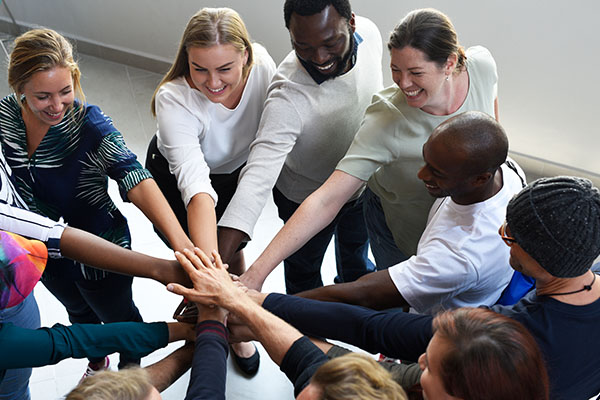
Diversity, Equity, And Inclusion: If you want to bring other nationalities and people of other cultures into your organization, make them feel welcome.
To give you a real quick example of that, I had someone who was interviewing me to be a consultant. They said, “Have you ever visited our organization?” I said, “No.” I know they were a little surprised that I’ve never been invited, and that’s the key. If you have a service or business and you want to bring in people who are Black, indigenous, people of color, or a gender orientation, invite them in. Optics are important. Pretty much as we’re in this virtual world for a moment, optics may be all any others have. What does your website look like? Who do you show? Is it diverse culturally rich? If it isn’t, let it be.
What kind of message are we sending when it’s not? That looks beautiful but everybody is the same. I’m absolutely the worst person to be trying to share anything on this topic other than my own efforts to try to be more aware and more inclusive. Demographically, I’m a middle-aged White man. I’m the least diverse person by definition. Two experiences for me created more awareness. One of them was a two-year experience. I served a mission in a foreign country. I lived in Mexico for two years. I went from the first 19 or 20 years of my life not understanding what it felt like to be in the minority to all of a sudden, being that completely. I was the only one that looked and talked like me. I was completely in the reverse situation for two years. That helped me tremendously.
What did you learn from that?
I learned what you started out with. Everybody has a story. When we connect as human beings, all the rest melts away. When you get to know a person, not the rapper, not the label, not the outside, and when you get to know the true heart of someone and you talk as people and you’re vulnerable, that changed everything for me.
To this day I have this tremendous fondness for the Mexican people. I love them to death. I love their ways and culture, some of their beliefs, habits, and the things that make them. I wish I could spend two years of my life in every single unique culture. That was great for me personally. I also know it’s impractical to recommend that as a best practice. Go spend two years somewhere away from everything you knew. Turn your world upside down a little bit and go try that. To those who can, go experience it. Even 1 or 2 weeks at a time, go serve in another place. That would be a tremendous value to anyone.
Can I make a suggestion for those who have traveled like you and me? Become a member of the Chamber of Commerce. We have the only Urban Indigenous Peoples Chamber of Commerce. An exceptional woman runs it. Become a member. Go to their lunches. Go online with them. Make friends. We have the African-American Chamber of Commerce. There are many of us who are not going to be able to travel. I don’t know if I’ll ever be able to go back to some of the places that I’ve trained in. There are a couple of win-wins there. You become a member of their organization. They get to know about you and you get to know about them. We break down the barriers between people in that way. That’s just an idea.
That’s a great idea. You also mentioned one earlier that I’m going to repeat. It’s the idea of getting on Zoom Live and having views into a world that you would otherwise not have experience in. That’s powerful. There are lots of tools now. Clubhouse is one of these social gathering places. People can listen in. You can join all sorts of groups. There are Facebook Live and LinkedIn groups. There are many ways outside of getting on a plane and going somewhere physically, which would be my preferred first choice, but there are lots of ways to learn and connect. We can dedicate some time to that regularly.
It could even be fun.
Make new friends. Learn new perspectives and have some fun along the way. Do you mind if I share the other experience that I had that changed me? This one is a little harder for me to talk about.
Yes.
I don’t want this to be about me. I want this to be about the change that is possible in all of us when we engage in these conversations. I worked in a big company early in my career, and there was some sensitivity training around the LGBTQ community. At the time, it was just LGBT. Even after I had the experience that helped me see people in a new way. I went and served in Mexico for two years. That helped me with nationality, ethnicity, and all the other things that at the time we would have typically called diversity. I was like, “I’m good there.”
I found myself in a face-to-face situation with somebody who was openly gay. At the time, that was not as talked about as much. It wasn’t as understood and as common for people to be open about their sexual orientation. It was very different from my upbringing and what I was taught to be right or wrong. It was a hard situation for me as an HR leader in a business or in a location with thousands of people, where we were trying to help everyone treat each other with dignity, respect, and inclusion. Here I was, face-to-face with something that I didn’t realize was going to be difficult for me.
The transformation in me was powerful because as we worked through those sessions, it wasn’t a change in anybody else. It was all a change in me. What I found to be powerful was through that experience where I came to break through some strongly held beliefs or thinking patterns in my own brain that weren’t right and where I saw somebody now as a person still first. They are people and not something that I need to be afraid of or some objects that are bad. Here’s a real person with real feelings, thoughts, and all the other things that human beings have.
It was good for me to go through that experience as a fairly young man and realize, “I thought I had a handle on this. Accept everyone for who they are no matter what.” I realized I still had something blocking that until I went through that experience and now I’m like, “They’re still a person like me.” I don’t know if that’s even useful for anybody, but if that unlocks some ideas for you that would be helpful to share, I wanted to offer that up.
There are some words that are used in the DE&I space that I suggest lead right into what you’re talking about. The concept of a stereotype and beliefs that we have about a certain group of people. The danger of a stereotype is that when we say, “All people are,” that is the stereotype, “All African-American women are. All Black men are. All Asians are.” Without exception, that becomes a stereotype. It can lead to undervaluing and disrespecting people. It can even lead to not being able to hire somebody who’s exceptional because of a stereotype.
Stereotypes can lead to undervaluing and disrespecting people. It can even lead to companies passing up on exceptional individuals. Share on XI’m glad you brought that up. The implications are you might not get the best talent, you might create a brand, even unintentionally, that offends would-be customers and partners. There are many implications to this. I know you’ve spent a lot of time talking about the money side of the equation of DE&I or Diversity, Equity, and Inclusion as an investment in your business. There are all these financial reasons that we won’t get into here, but let’s both agree that financially, it makes all the sense in the world. That’s not what’s holding this back. The business case is there. What holds us back are the stereotypes, filters, and the things that our brains over time have created. They’re trying to protect us from something when it’s shielding us from great things.
It’s the first thing that we think of when we look at somebody, maybe a stereotypical point of view, but then when the story kicks in or when you get to know him, her, or them better, then there’s a new possibility. That’s what diversity, equity, and inclusion is for me. It’s about creating a possibility that wouldn’t have happened otherwise, having people that work with you and not paying them all the same amount or because of some bias. I had one client that was a hospital. The relationships between the doctors and the nurse or the doctors and the people who clean up the hospitals. That was something that we got to talk about because having a hospital is important, especially nowadays, and having teams of people who work together well is vital.
If you can get to DE& I, those are letters. There are differences, there is honoring people, there is bringing them into your organization and having people feel like they belong or that they’ve been invited to the party or the organization, etc. Those are shorthand words for being a human being, inviting people in, having a great life, and sharing your financial wealth. Meaning to share that wealth that has you got that business functioning. It’s my personal philosophy on it and that’s where I am.

Diversity, Equity, And Inclusion: DEI are just shorthand words for a human being. Share your financial wealth with others to keep your business functioning.
JP, as the beautiful human being that you are, you summed it up well, but I want to give you one more invitation to get people thinking about changes they can make in themselves that would impact everyone that they work with as business owners. How do we more accurately look at ourselves in the mirror and say, “What’s missing? Where do I need to improve?” What have you seen as a coach that helps people have little breakthroughs around this? Small, but maybe seemingly insignificant, but have huge ramifications if they see things a new way.
I’ll leave everyone with this one. There are a couple of points of view. Let us say that the business that you have now isn’t ordinary business. It’s a good business. Who would you want with you on your team to be extraordinary? There’s the ordinary, not bad, not wrong, then there is the extraordinary. What and who can take you from the ordinary to the extraordinary?
If it’s having new ideas, being created, learning more about people, having new products and services, having people be healthier with you, and you see that possibility, there are more ideas available to you when your team is diverse. If it’s a board of directors or an advisory group, make it diverse and see what happens. Take that chance. Go out on those skinny brands of life and see what’s possible. For me, diversity, equity, and inclusion is all about creating the impossible that could be possible with people who are not like us.
I love that. I was also thinking about to be the change you want to see. There is lot of finger-pointing in our world and divisiveness. How do we in our respective spaces be bridge builders and we welcome? How do we help people feel belonging? That’ll go a lot further than a lot of the divisive things we see in our political world.
There are a lot of great courses out there and books. I love reading books. Read a new book. It gets you going.
How do people learn more about what you do or any suggested places that they go to to connect with you and get on the right track?
Can I add something there by getting on the right track?
Yes.
One of the pieces that I shared, there’s no right or wrong. There is what works and what doesn’t work for you. If having a joyful outrageous possibility in your organization works for you, let me know. Reach out to me at www.PositivelyPowerful.com. I also have a calendar and they can schedule a complimentary session, talk, strategy session, or whatever with me. Bring their own questions to their call and send me an email at JPMartin@TribeWest.com and we’ll find a way to put them in.
There is no right or wrong. There are only things that work or don’t work for you. Share on XThank you so much for being with us. It’s fabulous as always to spend a little time with you.
Thank you for being who you are and the contribution you’re making to business owners. That’s exceptional.
If you’ve tuned in to our time together, Dr. Martin shares lots of great things. I would encourage you to connect with her. Also, please rate, share, review, and do all the things to make this show more available to others that you know so we can help as many people as possible in their seven-figure growth journey. Thanks for tuning in. We’ll see you next time.
Important Links
Want to listen to more? View all episodes here >
